May 30, 2025

The article titled "10 Key Insights from the BACB Task List 6th Edition" presents crucial updates and implications of the BACB Task List for Board Certified Behavior Analysts (BCBAs). Notably, the 6th Edition introduces 104 tasks that underscore the importance of:
These elements are essential for BCBAs to navigate the evolving demands of the field and significantly improve service delivery. As the landscape of behavior analysis continues to shift, it is imperative for professionals to stay informed and adapt accordingly.
As the landscape of Applied Behavior Analysis (ABA) continues to evolve, a projected 25% increase in demand for Board Certified Behavior Analysts (BCBAs) by 2026 signals a transformative shift. This statistic underscores the urgency for professionals in the field to adapt to new standards that emphasize ethical practices, cultural humility, and innovative methodologies. The recent updates to the BACB Task List are not merely changes; they are a call to action for BCBAs to enhance their competencies in alignment with contemporary challenges in behavior analysis.
This article delves into the significant changes introduced in the 6th Edition of the BACB Task List, highlighting how these revisions empower BCBAs to navigate a dynamic environment effectively. Opportunities for growth and professional development in ABA are abundant, from streamlined job matching platforms to the integration of technology and data-driven decision-making. As BCBAs consider their current practices, it is crucial to understand how these updates can ensure effective service delivery and foster positive outcomes for clients.
Are you facing challenges in hiring qualified BCBAs? Understanding these updates will not only prepare you for the evolving landscape but also enhance your recruitment strategies. Engage with the Hire ABA platform to explore how these new standards can support your hiring needs and elevate the quality of service provided to clients.
The demand for Board Certified Behavior Analysts (BCBAs) is projected to surge by 25% by 2026, leading to an estimated 30,000-35,000 new positions. Hire ABA is dedicated to improving the job search experience for these professionals by providing a specialized platform that connects them with top job opportunities. This dual benefit not only saves valuable time for job seekers but also empowers employers to swiftly identify and recruit the right talent. Are you facing challenges in finding qualified candidates? Hire ABA facilitates a seamless match between candidates and roles that align with their expertise and career goals.
ensure that each BCBA's experience and aspirations are thoroughly evaluated. We utilize advanced job fit scoring to identify opportunities that match their skills, preferences, and desired locations. Furthermore, with the rise of telehealth services for behavior analysts growing at an annual rate of 25-30%, effective recruitment strategies are essential to meet this demand. By leveraging innovative approaches, such as partnerships with universities, implementing paid internships, and utilizing targeted outreach methods, Hire ABA is at the forefront of addressing staffing challenges in this dynamic sector.
Moreover, average salaries for range from $72,000 to $82,000, making the opportunities offered through Hire ABA not only satisfying but also financially beneficial. Join us in fostering a supportive environment that is crucial for the continued growth and success of the ABA field. Explore how Hire ABA can transform your recruitment process today.
6th Edition introduces substantial updates, notably increasing the total number of tasks from 92 to 104. This expansion highlights the dynamic nature of the field and underscores the necessity for behavior analysts to enhance their knowledge and skills in alignment with contemporary standards in behavior analysis. Key updates include:
These revisions are meticulously designed to prepare behavior analysts for the certification examination based on the BACB Task List 6th Edition, set to commence on January 1, 2025, reinforcing the importance of adapting to these evolving guidelines.
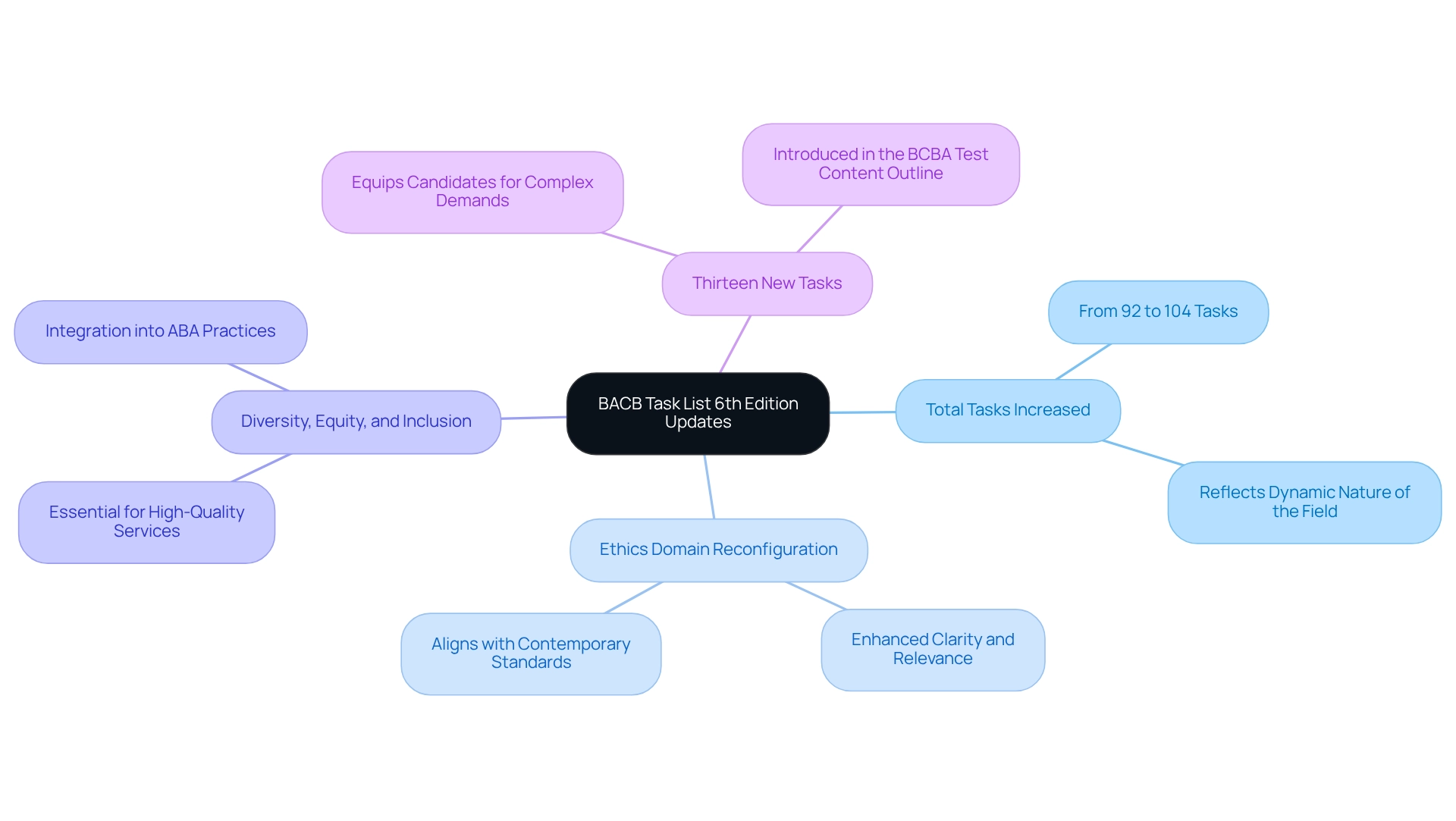
The demand for (BCBAs) is projected to rise by 25% by 2026, making the 6th Edition Task List a critical resource for professionals in this field. This edition significantly broadens its focus areas, emphasizing comprehensive behavioral assessment, intervention strategies, and ethical considerations. Such an expanded scope enables BCBAs to effectively navigate various situations in their work, fostering a comprehensive approach to behavior analysis.
By incorporating a variety of methodologies and frameworks, the Task List encourages BCBAs to adopt innovative approaches that enhance service delivery. Recent trends indicate that behavioral assessments are increasingly tailored to individual needs, reflecting a shift towards personalized intervention strategies. Notably, Section G of the BCBA exam, which covers behavior-change procedures, constitutes 20% of the exam with 35 questions, underscoring the importance of these concepts in professional practice.
Consider the implications of this comprehensive approach. Case studies, such as Dr. Samantha Brown's work on functional relationships, illustrate how behavior analysis can effectively identify the interplay between behavior and environment, leading to successful outcomes for individuals with autism. This approach not only enhances the quality of ABA services but also aligns with the anticipated demand for board-certified behavior analysts.
As the market for ABA therapy continues to expand, BCBAs who are knowledgeable about the Task List will be better positioned to seize new opportunities. This includes leadership roles and flexible working conditions, allowing professionals to advance their careers and impact more lives in this dynamic field. Explore your career options today to take advantage of the expanding opportunities in ABA therapy.
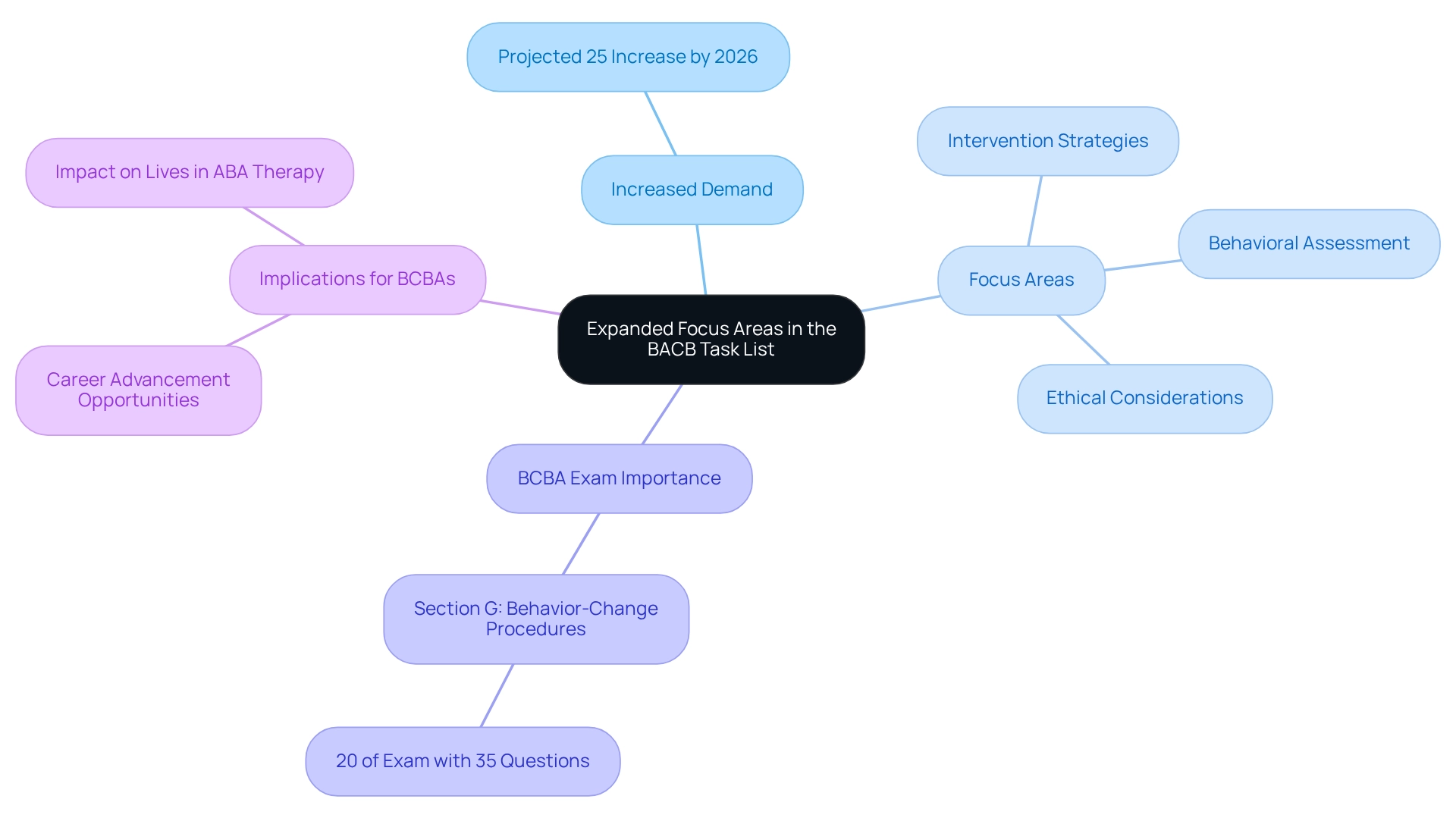
The demand for behavior analysts is projected to increase by 25% by 2026, underscoring the critical need for professionals who adhere to high ethical standards. The BACB's commitment to maintaining ethical standards in behavior analysis is reflected in the BACB Task List 6th Edition, which places a heightened emphasis on ethical conduct. This includes specific tasks related to ethical decision-making and the application of the BACB's Professional and Ethical Compliance Code. Behavior analysts are now mandated to demonstrate a comprehensive understanding of ethical principles and their application to various situations in the field, ensuring that client welfare remains a primary concern.
Real-world examples illustrate how behavior analysts utilize ethical decision-making frameworks to navigate complex scenarios, ensuring compliance with established ethical standards. For instance, the case study titled 'Ethical Decision-Making in ABA' connects the principles of evidence-based approaches (EBA) of ABA with the BACB Ethics Code, emphasizing the importance of ethical conduct in behavior analysis. Research indicates that ethical education positively impacts client outcomes, with data showing that behavior analysts who prioritize ethical approaches report higher satisfaction levels among clients and stakeholders. Insights from behavior analysts reveal that the focus on ethics within the BACB Task List 6th Edition not only enhances professional integrity but also fosters trust in therapeutic relationships. As the BACB states, 'Behavior analysts should incorporate measures of social validity as a source of evidence at the local level,' reinforcing the notion that ethical practice is essential for effective strategies. Understanding and applying these ethical guidelines will be vital for professionals in the field as the .
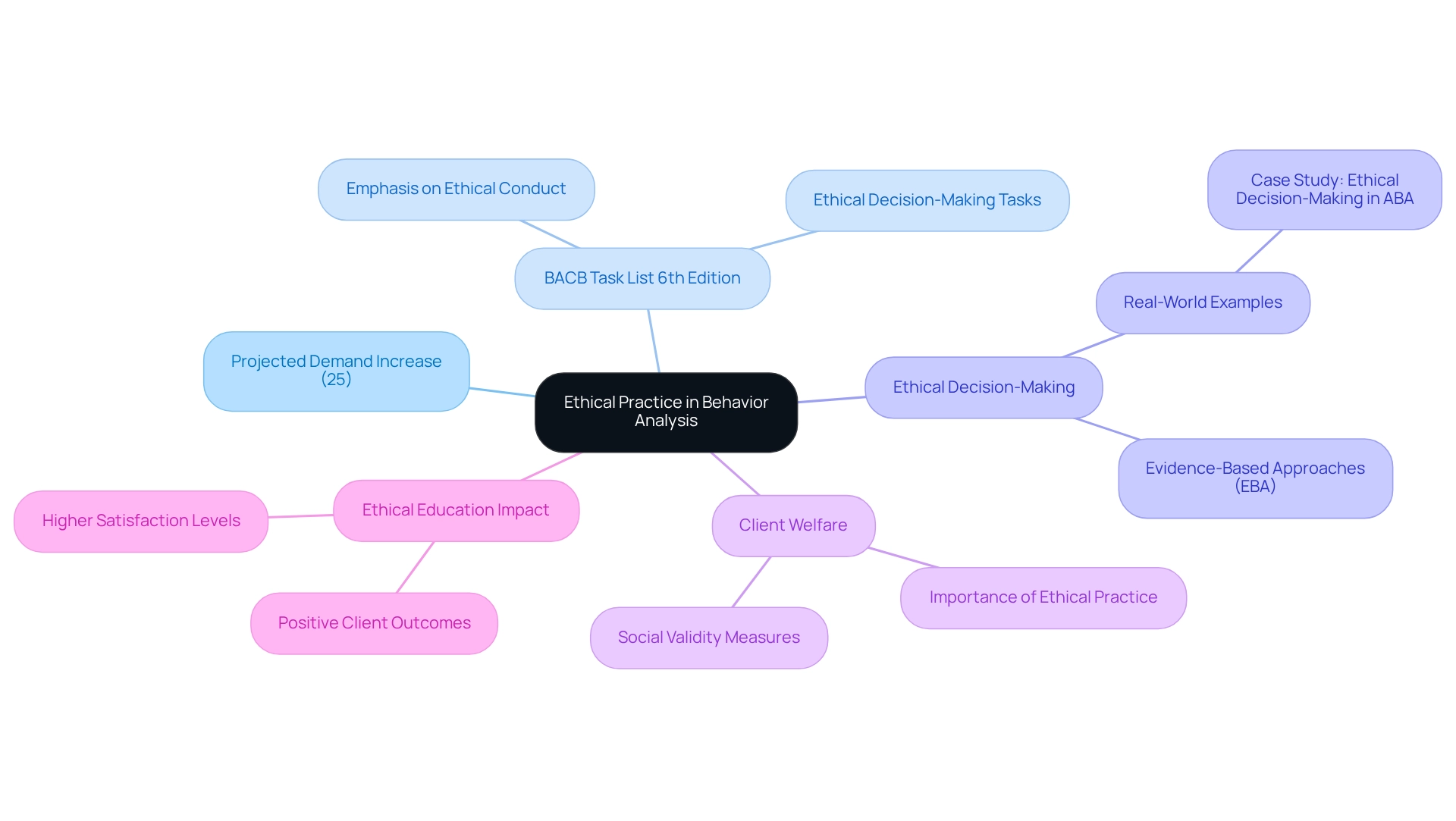
The bacb task list 6th edition emphasizes the significant impact of technological innovations on behavior analysis, reflecting the increasing importance of digital tools in this field. Behavior analysts are now encouraged to leverage technology for data gathering, analysis, and planning. This evolution not only improves the accuracy of assessments but also facilitates more efficient tracking of client progress. By embracing these advancements, behavior analysts can enhance service delivery and achieve better outcomes for their clients.
As illustrated in the case study 'Embracing the Future of ABA Therapy,' the integration of tools such as virtual reality and telehealth is paving the way for more personalized interventions, ultimately fostering greater independence for individuals with autism and .
Michelle Temporada, an ABA Therapist, underscores that effective supervision, parental involvement, and strategic application are crucial to ensuring that technology serves as an asset rather than a dependency. By harnessing these innovations, behavior analysts can position themselves at the forefront of the field, contributing to the anticipated 25% increase in demand for their expertise by 2026.
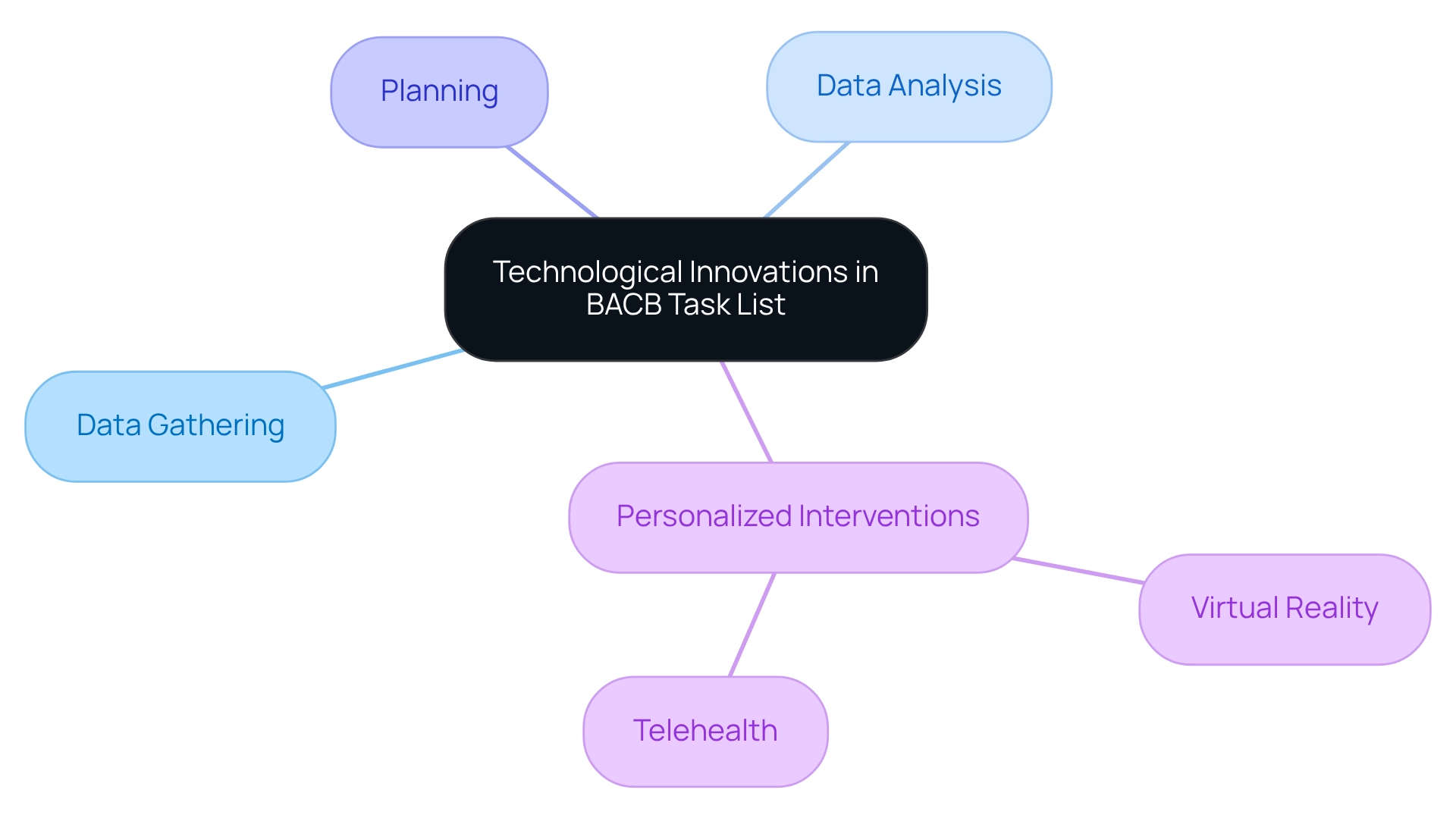
The demand for Board Certified Behavior Analysts (BCBAs) is projected to surge by 25% over the next five years, underscoring the critical need for effective mentorship and continuous professional development in the field of behavior analysis. The BACB Task List 6th Edition outlines updated supervision and training requirements, highlighting must possess and the requisite number of supervision hours. By adhering to these enhanced standards, behavior analysts can prepare themselves to mentor the next generation of professionals, fostering a culture of continuous learning and improvement.
This growth in the ABA therapy sector opens new doors for career advancement, including higher salaries and leadership roles. A recent survey revealed that soft skills, such as building relationships and providing feedback, are deemed essential for behavior analysts and trainees. This finding emphasizes the need for mentorship programs focused on developing these competencies. Such initiatives not only enhance professional growth but also equip Board Certified Behavior Analysts to navigate the evolving landscape of behavior analysis effectively.
Healthcare employers are encouraged to implement mentorship programs that prioritize these soft skills, creating a supportive environment for behavior analysts. Are you prepared to seize the growing opportunities in the ABA therapy market? By investing in mentorship, you ensure that your team is well-equipped to thrive in this expanding field.
The demand for qualified behavior analysts, as indicated by the BACB Task List 6th Edition, is projected to increase by 25% by 2026. This statistic underscores the and support methodologies as highlighted in the BACB Task List 6th Edition within the dynamic field of ABA. Behavior analysts are now expected to demonstrate proficiency across a broader spectrum of assessment methods and strategies, emphasizing the importance of evidence-based practices. Incorporating client feedback into the treatment process not only enhances the responsiveness of therapies but also boosts their overall effectiveness.
Recent research indicates that while certain areas, such as receptive language outcomes, may not show substantial effectiveness from ABA practices, the need for skilled behavior analysts continues to rise. For instance, a study employing statistical techniques like logistic regression and chi-square tests has shed light on the factors influencing the duration of ABA services, thereby enriching our understanding of effective implementation.
By remaining informed about these essential updates, behavior analysts can ensure their strategies are not only effective but also tailored to meet the evolving needs of their clients. Are you ready to elevate your hiring practices and address the challenges in recruiting qualified professionals? Explore how Hire ABA can support you in navigating this complex landscape and securing the right talent for your organization.
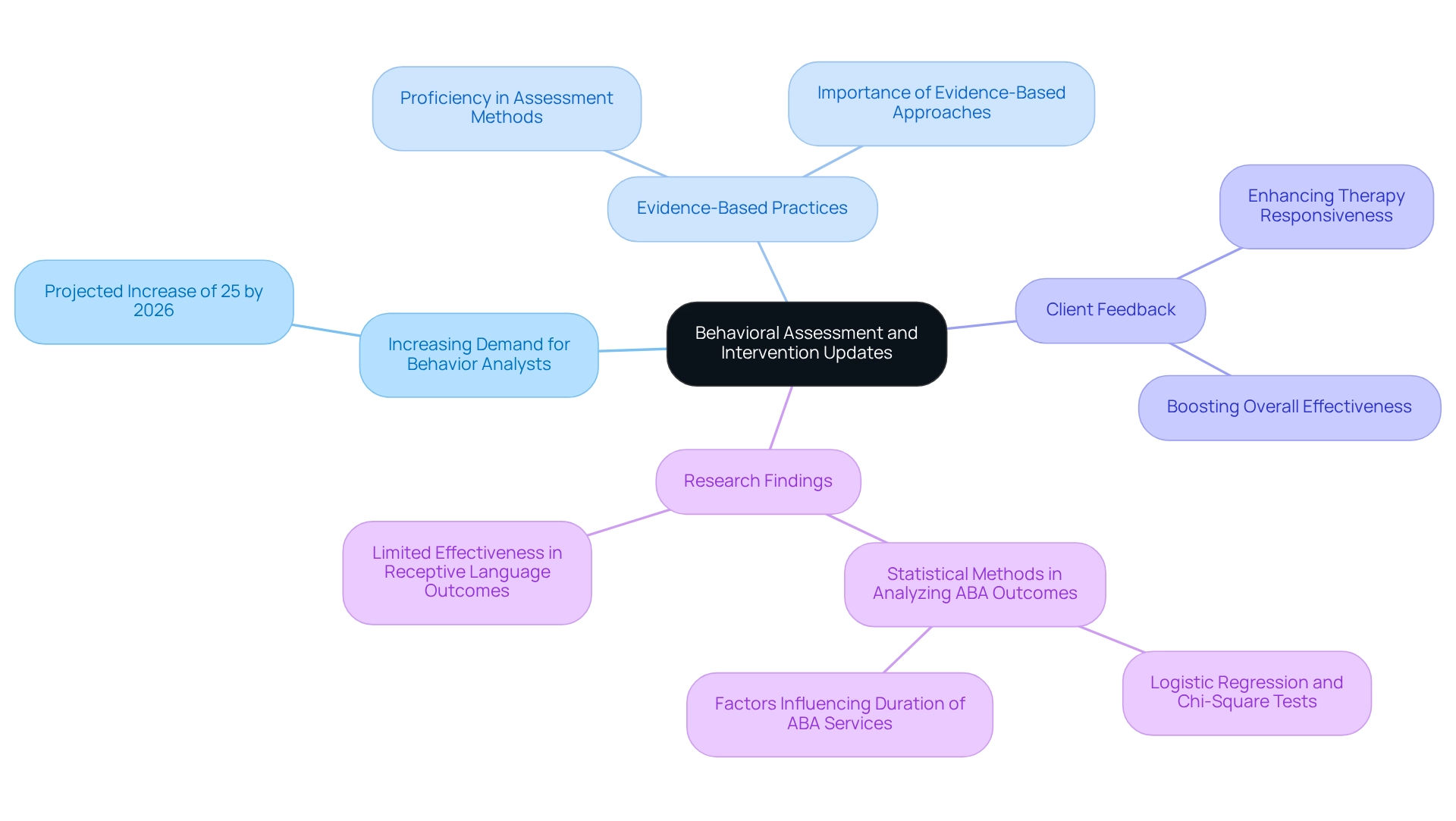
The is projected to rise by 25% by 2026, underscoring the importance of effective practices in the field. The BACB Task List 6th Edition introduces cultural humility as a critical component of effective behavior analysis. BCBAs are urged to engage in self-reflection and recognize their own cultural biases while working with diverse populations. This emphasis on cultural humility not only promotes inclusive practices but also ensures that approaches are tailored to the unique cultural contexts of clients.
Research indicates that early, consistent, and intensive ABA strategies lead to improved long-term outcomes for children with autism, highlighting the need for culturally informed methods (Journal of Autism and Developmental Disorders). By integrating cultural factors into their work, behavior analysts can enhance the effectiveness of their interventions and foster stronger relationships with clients. For example, a study titled 'The Role of ABA Therapy in Supporting Positive Family Dynamics' demonstrated that families experienced improved communication and relationships, illustrating the significance of cultural sensitivity in nurturing supportive home environments.
As the field evolves, the incorporation of cultural humility into the BACB Task List 6th Edition is not only timely but essential for advancing ABA therapy. Behavior analysts are encouraged to actively pursue cultural humility training to ensure their methods remain relevant and effective. Are you ready to embrace this critical aspect of practice? The time to act is now.
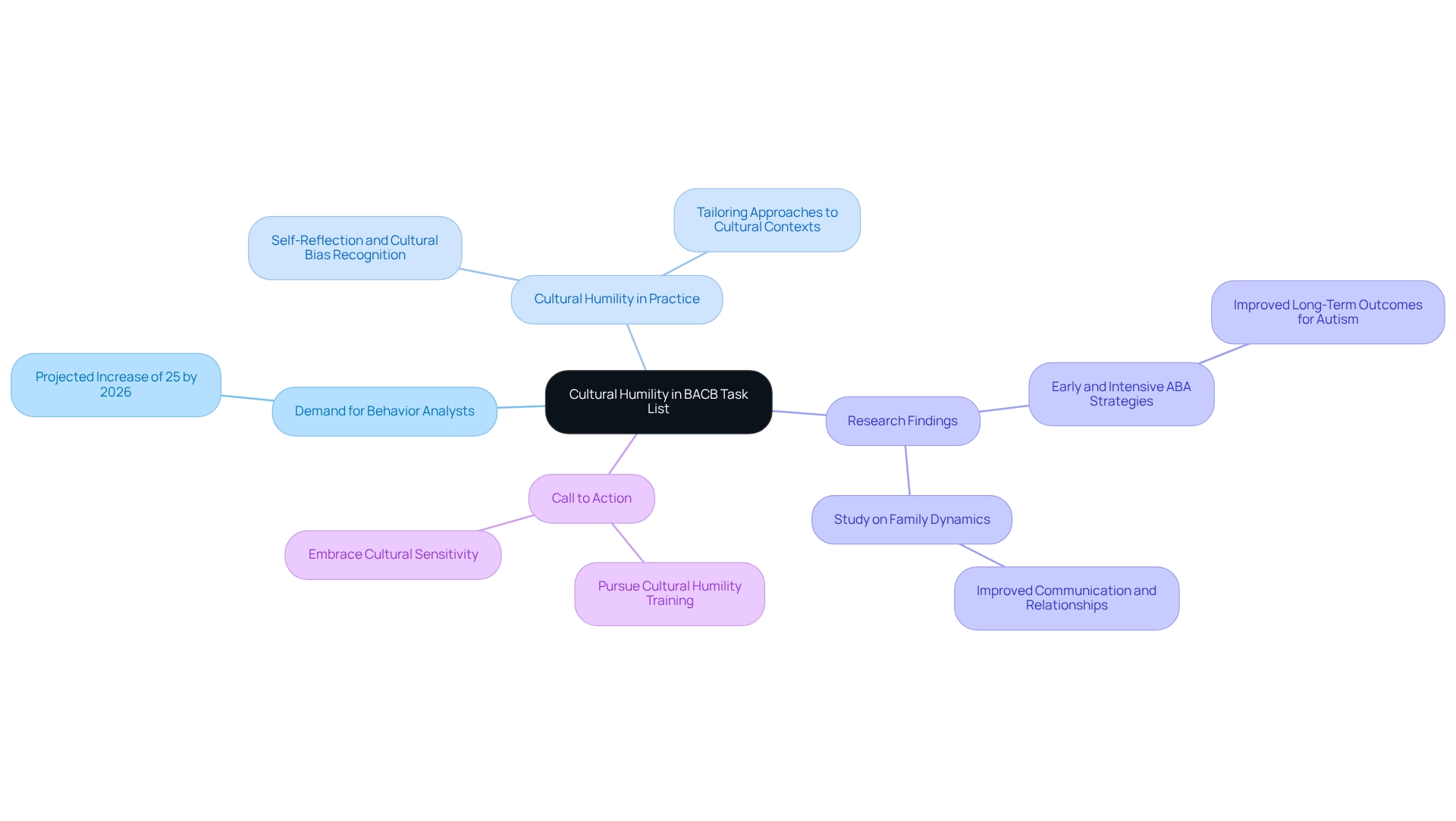
The 6th Edition Task List underscores the critical role of data-based decision-making in behavior analysis. Behavior analysts must systematically gather and evaluate data to inform their approaches and assess their effectiveness. This focus on data-oriented methodologies ensures that behavior analysts make informed decisions, leading to improved outcomes for clients. By prioritizing data in their practice, behavior analysts enhance the reliability and validity of their strategies.
Engaging parents in training equips them with essential techniques to reinforce learned behaviors at home, fostering a collaborative environment that aligns with therapy goals. As one parent observed, 'It fosters better communication and trust between families and therapists, which can result in faster progress and enhanced effectiveness of the therapy.'
For example, Supportive Care ABA illustrates how tailored attention to each child's needs yields more effective strategies, aligning therapy with individual strengths and challenges. As we move into 2025, the emphasis on data-driven decision-making in ABA continues to evolve, with being crucial for informed choices rather than guesswork.
Real-world examples demonstrate how Board Certified Behavior Analysts leverage data to guide their interventions, following the BACB Task List 6th Edition guidelines. The integration of data collection into ABA therapy not only supports the development of effective strategies but also reinforces the significance of systematic data collection in achieving optimal outcomes.
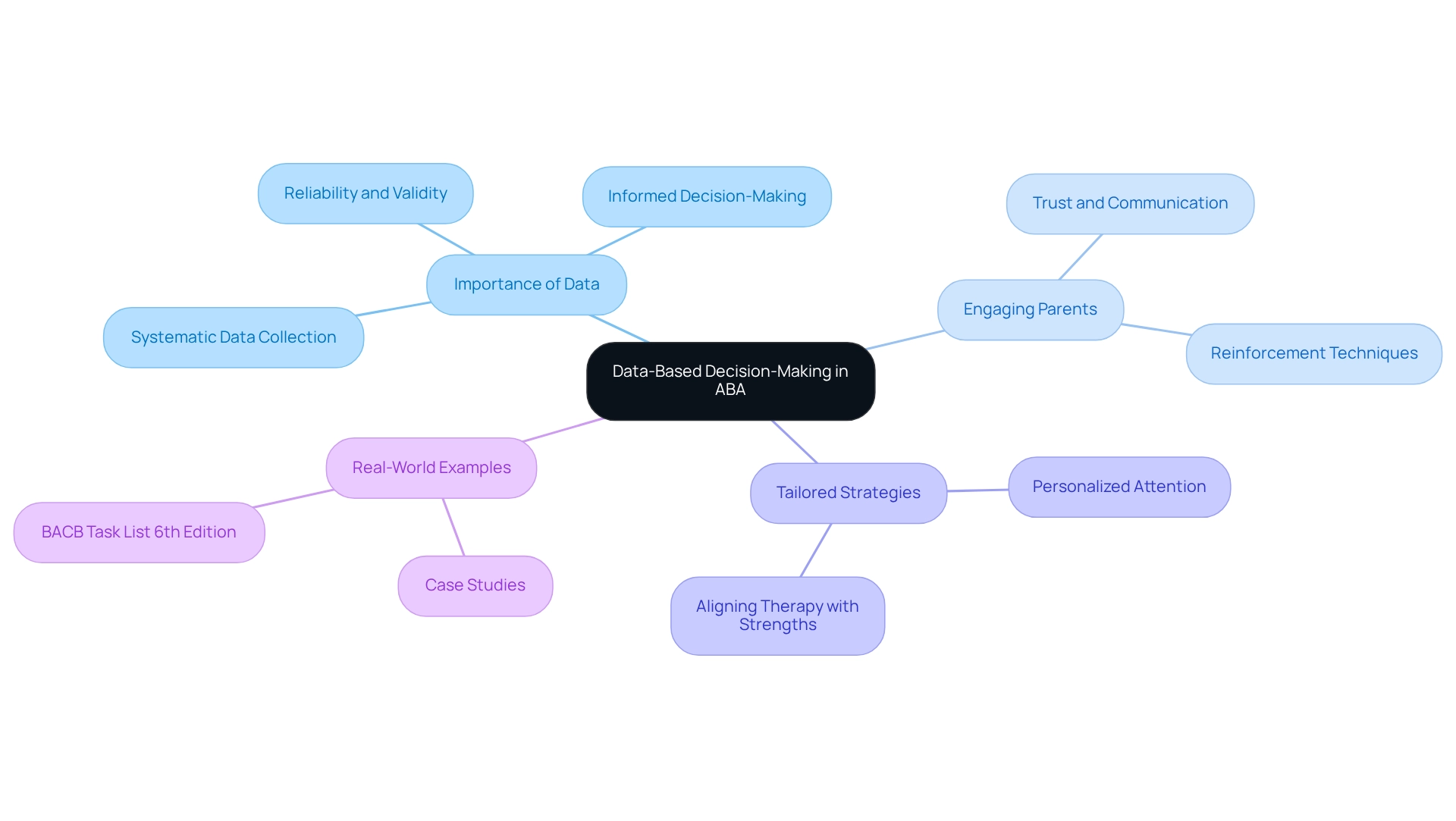
The bacb task list 6th edition introduces pivotal changes that significantly impact behavior analysts' training, practice, and professional development. The updated bacb task list 6th edition enhances clarity and focus by removing nine tasks and streamlining ten tasks into five. This allows behavior analysts to align their skills more effectively with current industry demands. Notably, the Ethics domain now includes 12 specific tasks, highlighting the critical importance of ethical principles in practice.
BCBAs are encouraged to pursue additional training to integrate these expanded focus areas into their work effectively. This may involve revising intervention strategies and deepening their understanding of cultural and ethical considerations. Particularly, eight tasks across four domains now address diversity, equity, and inclusion (DEI). The case study, ', and Inclusion,' illustrates how DEI content has been woven into various areas, demonstrating the increasing recognition of cultural factors in behavior analysis and promoting equitable practices within the discipline.
By actively adapting to these new demands, behavior analysts can enhance their professional growth and position themselves as leaders in the field. The market is thriving, and staying informed about high-demand positions ensures that BCBAs are always well-positioned—whether they are ready to advance now or simply exploring their options. Embracing these changes not only ensures compliance with the updated guidelines but also elevates the quality of care provided to clients, ultimately fostering better outcomes in Applied Behavior Analysis.
The evolving landscape of Applied Behavior Analysis is underscored by an anticipated 25% increase in demand for Board Certified Behavior Analysts by 2026. This statistic highlights the challenges and opportunities that professionals in the field will face. The updates introduced in the 6th Edition of the BACB Task List are pivotal, equipping BCBAs with essential tools and frameworks to navigate contemporary demands effectively. With a broadened emphasis on ethical practices, cultural humility, and the integration of technology and data-driven methodologies, these changes reflect a commitment to enhancing service delivery and improving client outcomes.
As BCBAs embrace these updates, they position themselves not only for compliance with new standards but also for leadership roles within the industry. The focus on mentorship and ongoing professional development fosters a culture of continuous improvement, ensuring that the next generation of behavior analysts is well-prepared to meet the increasing demands of the field. The incorporation of diverse focus areas, including behavioral assessment and intervention strategies, emphasizes the necessity for practitioners to remain informed and adaptable.
Understanding and implementing the changes outlined in the BACB Task List is essential for BCBAs aiming to thrive in this dynamic environment. By leveraging these updates, BCBAs can enhance their professional practice, improve client relationships, and ultimately contribute to a more effective and ethical ABA community. The journey ahead is filled with potential, and those who actively engage with these transformative standards will be best positioned to make a lasting impact in the lives of those they serve.
What is the projected demand for Board Certified Behavior Analysts (BCBAs) by 2026?
The demand for BCBAs is projected to surge by 25% by 2026, leading to an estimated 30,000-35,000 new positions.
How does Hire ABA assist job seekers and employers in the ABA field?
Hire ABA provides a specialized platform that connects BCBAs with top job opportunities, saving time for job seekers and helping employers swiftly identify and recruit qualified talent.
What services does Hire ABA offer to improve the job search experience for BCBAs?
Hire ABA offers personalized resume assessments and advanced job fit scoring to match candidates with opportunities that align with their skills, preferences, and desired locations.
What is the average salary range for board-certified behavior analysts?
The average salaries for BCBAs range from $72,000 to $82,000.
What are some recruitment strategies employed by Hire ABA?
Hire ABA utilizes innovative approaches such as partnerships with universities, paid internships, and targeted outreach methods to address staffing challenges in the ABA sector.
What significant updates does the BACB Task List 6th Edition introduce?
The 6th Edition increases the total number of tasks from 92 to 104, reconfigures the Ethics domain, integrates diversity, equity, and inclusion topics, and introduces thirteen new tasks.
When will the revised BACB Task List 6th Edition be implemented?
The revised BACB Task List 6th Edition will be implemented on January 1, 2025.
How does the Task List 6th Edition impact the training of behavior analysts?
The Task List emphasizes comprehensive behavioral assessment, intervention strategies, and ethical considerations, preparing BCBAs for the certification examination and enhancing their service delivery.
What is the significance of Section G in the BCBA exam?
Section G, which covers behavior-change procedures, constitutes 20% of the exam with 35 questions, highlighting the importance of these concepts in professional practice.
How can BCBAs benefit from knowledge of the Task List?
BCBAs knowledgeable about the Task List will be better positioned to seize new opportunities, including leadership roles and flexible working conditions, in the expanding market for ABA therapy.
Our expert recruitment strategies and AI-driven sourcing ensure that you receive top-notch candidates quickly, without compromising on quality. Whether you’re looking for BCBAs, Clinical Directors, or RBTs, we’ve got you covered.